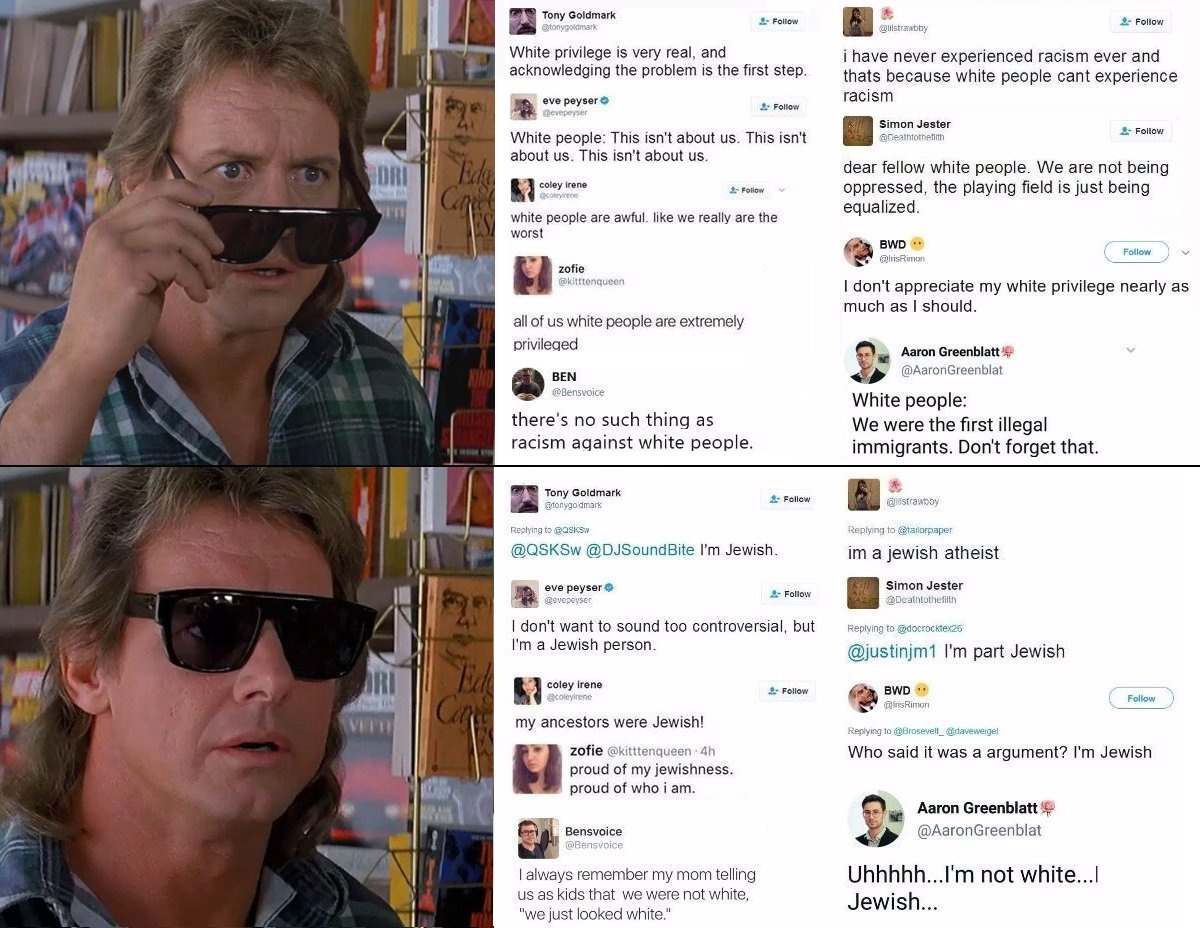John Friend and Andrew Carrington Hitchcock are mentioned in a NY Times Article (imagine that)
By Julia Jacobs
Image

A
Republican congressional candidate in a reliably blue California
district managed to capture nearly a quarter of votes cast in the
state’s open primary last month — just after the state Republican Party
caught wind of his anti-Semitic comments and rescinded its automatic
endorsement.
The candidate, John
Fitzgerald, urged people on his campaign website to pay attention to
“Jewish supremacism,” among other anti-Semitic views, which led party
leaders to rescind their support in May, about two months after the
official endorsement.
In the weeks
since, Mr. Fitzgerald has increased the frequency of his anti-Semitic
statements and has appeared on podcasts in which he claimed the
Holocaust was a fabrication.
“Everything
we’ve been told about the Holocaust is a lie,” Mr. Fitzgerald said last
week on a radio show hosted by Andrew Carrington Hitchcock, an
anti-Semitic commentator who has glorified Hitler.
“My entire campaign, for the most part, is about exposing this lie,” Mr. Fitzgerald said.
The
brief endorsement of a Holocaust denier by a major political party in
California has prompted Republican leaders there to take candidate
vetting more seriously, and comes at a time when extremist and
anti-Semitic candidates are receiving increased exposure on the national
political stage.
Mr. Fitzgerald received 23 percent of the vote
to finish second in the 11th Congressional District’s June primary,
which is open to all candidates regardless of party and allows the top
two finishers to qualify for the general election. He is running against
Representative Mark DeSaulnier, a Democrat, in a district northeast of
San Francisco that has not elected a Republican to the House since 2004.
The
state’s Republican Party automatically endorsed Mr. Fitzgerald in March
because party rules say the organization will automatically back the
only Republican in the field, said Matt Fleming, a spokesman for the
California Republican Party. The party reversed its decision in May and
issued a statement denouncing his candidacy.
“Once
we learned of Mr. Fitzgerald’s anti-Semitic worldview in late May, we
moved immediately to undo the unfortunate automatic endorsement,” Mr.
Fleming said in an email.
In an
interview on Thursday, Mr. Fitzgerald said that he was not surprised the
Republican Party had disavowed his candidacy because both major
political parties in America are run by “Jewish elitists.”
Mr.
Fitzgerald, 54, said he was a small-business owner but would not
disclose what kind of business he runs. A LinkedIn page for a John
Fitzgerald that links to the candidate’s campaign website lists the
page’s user as a painting contractor.
The comments that alerted the party to Mr. Fitzgerald’s views were in a post on his campaign website
asserting that Jewish people played a “prominent role” in the Atlantic
slave trade and urging awareness of “Jewish supremacism.” Scholars have
countered historical claims that Jewish people dominated the slave trade
with research showing that their role was marginal.
Mr.
Fleming said the initial endorsement of Mr. Fitzgerald was preceded by
minimal vetting of his views. Now, he said, the party is bolstering its
vetting process by thoroughly surveying candidates’ public comments and
the content of their campaign websites.
Mr.
Fitzgerald’s qualification for the state’s general election makes him
the latest in a series of high-profile extremist candidates across the
nation — including Arthur Jones, a Holocaust denier described as a Nazi
by the Illinois Republican Party. Mr. Jones won the Republican
congressional primary in March in a heavily Democratic district that
includes part of Chicago. In Wisconsin, a white nationalist and anti-Semite, Paul Nehlen, is running for Speaker Paul D. Ryan’s vacated House seat.
In both instances, the state Republican Party distanced itself from the candidate and condemned his views.
In
the Thursday interview, Mr. Fitzgerald said that the Holocaust was a
“complete fabrication” and that the Israeli government was behind the
Sept. 11 attacks.
“There are a few
other people being honest in this country, and they’re all being
lambasted for telling the truth,” Mr. Fitzgerald said, referring to Mr.
Jones and Mr. Nehlen.
Mr.
Fitzgerald ran for Congress in California as a Democrat in 2010 and
2012, but did not receive the party’s endorsement in either case. He is
running as a Republican in November but said he identifies more as an
independent.
“Am I a Republican?” Mr. Fitzgerald said. “What is a Republican anymore?”
Mr.
DeSaulnier said in an interview on Thursday that he believed California
voters — more than 36,000 of whom voted for Mr. Fitzgerald — were
unaware of Mr. Fitzgerald’s views when they went to the polls. “People
see ‘R’ and they see ‘D’ and that’s how they vote,” he said.
Mr.
DeSaulnier, who was elected to office in 2014 and received 68 percent
of the vote in the June primary, said anti-Semitism is an “ugly and
evil” set of beliefs that he does not believe the residents in his
district will ultimately support.
On a
podcast called “The Realist Report,” released last month and hosted by
John Friend — a self-described independent journalist whom the Anti-Defamation League has called an anti-Semite — Mr. Fitzgerald lamented “Jewish control and supremacy.” In a blog post on his website, Mr. Fitzgerald wrote that Jewish people are behind a push for “multiculturalism, diversity and inclusiveness” throughout the United States and other “once predominantly white nations.”
Media Matters, a liberal nonprofit publication, drew attention this week to Mr. Fitzgerald’s podcast appearances.
Mr.
Fleming, the state Republican Party spokesman, said that if only one
Republican joins the race in California’s open primary system — often
called the “jungle primary” — the state party’s bylaws say the
organization will automatically endorse that candidate. He said that
before the California Republican Party endorsed Mr. Fitzgerald in late
March, one of the few “red flags” on his campaign website was conspiracy
theories about the Sept. 11 attacks. Mr. Fleming said he would have
alerted state Republican leaders if he had seen those statements before
the endorsement process.
Ron Nehring,
a former chairman of the California Republican Party and spokesman for
Senator Ted Cruz’s 2016 presidential campaign, said he was the first
person to alert the organization to the views expressed on Mr.
Fitzgerald’s campaign website, prompting discussion about disavowing the
candidate. Mr. Nehring said he planned to propose a change to the state
Republican Party rules to eliminate automatic endorsements.
Mr.
Fleming said the transition to the “top-two” primary system, adopted by
voters in 2010, has required an adjustment period for the endorsement
process.
The local Republican Party
in Contra Costa, a county encompassing the 11th District, never endorsed
Mr. Fitzgerald because he did not attend any of their meetings or
request an endorsement, said Matt Shupe, the chairman of the
organization. Mr. Fitzgerald said he had been unsuccessful in trying to
reach local Republican leaders.
Mr.
Shupe called Mr. Fitzgerald’s views unwelcome in the party, but said
there was “no legal way” to prevent a person from getting on the ballot.
Mr. Fitzgerald denied that his views were anti-Semitic.
“I
have friends that are Jewish,” Mr. Fitzgerald said. “I have no issue
with any people. I have issues with people who lie. It’s the elitists
who control it all.”










